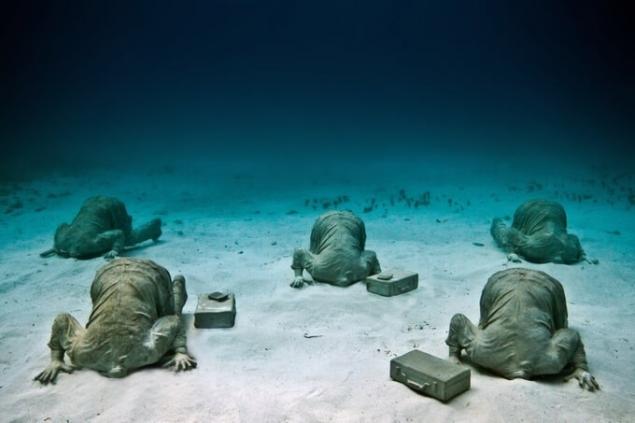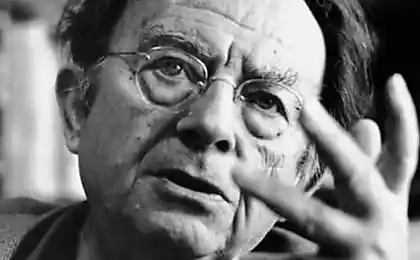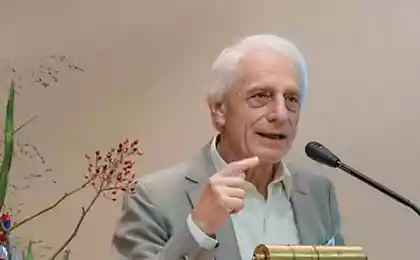815
Erich Fromm: The two poles - BE and HAVE
Reread the essay "The man alone", in which Erich Fromm reflects on man alone in the world, a comprehensive consumer about the mismatch between the two poles of human existence - "to be and to have", as well as the inexhaustible desire of man to overcome the routine and comprehension of the most important phenomena of life, which previously it found expression in art and religion, and today takes the form of interest to the criminal chronicles the love of sports and hobbies primitive love stories.

The work of the German sociologist, philosopher and psychologist Erich Fromm became a kind of a classic study of loneliness phenomenon in the XX century. He seems to consider this phenomenon from all possible points of view: Fromm analyzed the human loneliness, lost contact with other people; He singled out a separate type - moral loneliness, unable to relate to the values and ideals of the society; philosopher also pointed out that loneliness - in a sense, "natural" and "metaphysical" characteristic of the human being, this condition suschestovanie person, at the same time being a part of nature and is outside it, being able to understand not only the contradiction, but also his limb (1).
However, apart from these existential conditions of human existence, Fromm also saw the cause of loneliness of modern man is the way of life, which he dictates society, orienting the person solely on consumerism as the main aspirations in life (2).
In this sense, the article "The man alone" - a very brief, but extremely capacious description konsyumeristkogo society in which a person whose whole life is focused on the production, sale and consumption of goods, he becomes a commodity and becomes a lonely, alienated from its nature personality <. br>
By analyzing both the consumer society a person becomes a stranger to himself, turns into a servant of the world, which he himself has created, Fromm notes that at all times there was a contradiction between the two main ways of human existence - the possession and being, between the commonplace and the desire to return to authentic basics of human existence.
However, with bitterness, he notes, if before the loneliness and other eternal questions of being conceptualized through such higher forms like Greek tragedy, ritual actions and rituals, but today our commitment to the dramatization of the most important phenomena of existence - life and death, crime and punishment, human struggle with nature - badly crushed and took the form of passion for sports, the crimes of which we are each hour TV broadcasts, and melodramas with primitive passions of love. In this context, Erich Fromm says "immeasurable misery of all our searches and solutions", we are predlagaetm read his essay to take a fresh look at the reality to which we are accustomed, and perhaps try to change something in it.
Man alone
Alienation - that the individual under capitalism the fate
. By alienation I understand this type of experience, when a man becomes a stranger to himself. It is as if "ostranyaetsya", separated from himself. He ceases to be the center of his own world, the master of his actions; on the contrary - these actions and their consequences subordinate his own, he obeys them and sometimes even turns them into a kind of cult
. In today's society this alienation is almost comprehensive. It permeates the relationship of man to his work, to the objects he uses, apply to the State in the people around them, on him.
Modern people with their own hands created a world of hitherto unseen things.
To control mechanism technology he created, he built a complex social mechanism. But it turned out that it was his creation is now over and it suppresses it. He feels no longer the creator and master, but only a servant of the golem fashioned them. And the more powerful and ambitious unleashed their power, the weaker he feels creation - man. He was opposed by his own forces embodied in things created by him, force, now estranged from him. He came under the rule of its creation and no longer has power over himself. He made himself an idol - a golden calf - and says: "Here are your gods that brought you out of Egypt» ...
And what is the fate of the worker? Here is what responds to this thoughtful and accurate observer, the commercialization:
"In the industry the person becomes an economic atom that dances to the tune of as atomistic management. This is your place; this way you will sit; Your hands will move x inches in radius; the move - so many shares minutes. As soon as the planners, timekeepers, economists, scientists are increasingly deprived of the right of workers to freely think and act, work becomes more and more monotonous and mindless. Workers refuse in life itself: any attempt at analysis, creation, every manifestation of curiosity, every independent thought carefully expelled - and that inevitably workers remain either flee or fight; his destiny - or indifference thirst for destruction, mental degradation "(J. Dzhillispay.)
. But the fate of the head of production - the same alienation. However, he manages the entire enterprise, not just one part of it, but he just alienated from the fruits of their activities, does not feel it as something concrete and useful. His task - only to use with profit the capital invested by other
. Head, as a worker, like everyone else, has to deal with a faceless giants: a giant competitive enterprise with a huge national and global market, with a giant-consumers who have to seduce and manipulate adroitly, with the Giants, trade unions and giant-government. All these giants seemed to exist by themselves. They predetermine the actions of a leader, they also direct action of workers and employees.
The question of the leader brings us to one of the most important features of the world of alienation - to bureaucratization. Bureaucracy runs as a big business, and government agencies. Officials - that experts in management and things and people. And so enormous machine, which should be controlled and, consequently, so impersonal that the bureaucracy is completely alienated from the people. He is the people - only the control object to which the officials did not feel either love or hate it them completely indifferent; in all professional activities, the official head of the feelings have no place: the people for him no more than a figure or inanimate objects
. The enormity of the whole social organization and a high degree of division of labor, prevent the individual to embrace a whole; moreover, between these individuals and groups do not arise by itself a direct internal communication in the industry, and therefore can not do without leaders-officials: without them, the whole system would collapse immediately, because no one else has not led her secret motive springs
. Officials as necessary and inevitable as tons of paper, exterminates, under their rule. Each of us with a sense of complete powerlessness aware of this fatal primacy of bureaucrats, that's why they pay homage and almost divine honors.
People feel that if it were not officials, everything would fall apart and we would starve. In the Middle Ages it was considered a suzerain order carrier, established by God; in modern capitalist society officer - Special scarcely less sacred, because without it, society can not exist
. Man alone
Alienation prevails not only in production but also in consumption. Alienate the role of money in the purchase and consumption is well described by Marx ...
How can we use the acquired? I assume that consumption - a certain human action, which involves our senses, a purely physical needs and aesthetic tastes, then there is an action in which we act as a being sensing, feeling and thinking; in other words, the consumption process should be meaningful, productive, humanised. However, our culture is very far from this. Consumption of us - above all the satisfaction of artificially created whims, alienated from the true, the real of our "I»
. We eat tasteless bread dense nutrient-poor only because it meets our dream of wealth and position - because he is white and fresh. In fact, we eat only one game of the imagination, is very far from the food we chew. Our palate, our body is excluded from the process of consumption, in which they should be the main actors. We drink some shortcuts. Uncorking a bottle of Coca-Cola, we revel in the advertising picture, which is the same drink revels Cute couple; we revel in the slogan "Stop and cool off!", we follow the great American tradition, and less likely to quench their own thirst.
Initially it was assumed that if a person will consume more things and, moreover, better quality, it will be happier, be more satisfied with life. Consumption had a definite purpose - pleasure. Now it has become an end in itself.
The act of purchase and consumption became mandatory, irrational - it is simply an end in itself, and lost almost all connection with the use or the pleasure of the item purchased. Buy the most fashionable trinket, the latest model - this is the ultimate dream of everyone; before it recedes all, even the joy of living the most purchases.
Alienation in consumption covers not only goods that we buy and use; It is much broader and extends to our leisure. And how could it be otherwise? If in the process of man alienated from the affairs of their hands, if he buys and consumes not only and not just because these things he really needs, how can he actively and intelligently use their leisure hours? He always remains passive, alienated consumers. With the same detachment and indifference as goods purchased, "consumes" it sports games and movies, newspapers, magazines, books, lectures, paintings of nature, the society of others. He was not an active participant in life, he wants only "catch" all that is possible - to assign more of entertainment, culture and everything else. And the measure is not the true value of these pleasures to humans, but their market price.
Man is alienated not only on his work, not only on the things and pleasures, but also on the social forces that drive society and determine the fate of all its members.
We are helpless before the forces that govern us, and it affects all detrimental to the era of social catastrophes - wars and economic crises. These disasters seem by some natural disasters, whereas in fact they incur the man himself, however, unconsciously and unintentionally.
Impersonality and anonymity of forces, driving society, is inherent in the capitalist system of production.
We ourselves create our own social and economic institutions, but at the same time, hot and quite consciously reject any responsibility for it and hopefully or anxiously waiting that will bring us to the "future". The laws that govern us, as embodied our own actions, but these laws have become superior to us, and we - their slaves. Giant state complex economic system is no longer subject to the people. They do not know restraint, and their heads are like a rider on a horse, biting at the bit: he was proud that remained sitting in the saddle, but is powerless to send her running
. Man alone
What are the relations of modern man with his brothers?
This is the ratio of two abstractions, two living machines using each other. The employer uses those hires, the merchant uses customer. Today, in human relationships rarely syschesh love or hate. Perhaps, in the predominantly purely superficial friendliness and more external decency, but this appearance is hidden under the alienation and indifference. And there are many hidden and distrust.
This alienation of man from man leads to loss of general and social relations that existed in the Middle Ages and all other pre-capitalist social formations.
And how a person relates to himself?
He feels like a commodity that should be povygodnee sell on the market. And it does not feel that he was an active figure, the carrier of human strength and abilities. He is estranged from those of their abilities. Its purpose - to sell themselves dearly
. Alienation of the individual, held for sale, will inevitably lose to a large extent self-esteem, peculiar people, even at a very early stage of historical development. He inevitably loses a sense of his own "I", all sense of themselves as being unique. Things do not have their own "I", and the man became a thing as can not have it.
We can not fully comprehend the nature of alienation, if not to take into account a feature of modern life - its ever-increasing discolored, the suppression of interest in the most important aspects of human existence. This is a universal problem. Man must earn their daily bread.
But only if he can assert itself, if not come off from the foundations of its existence, if not lose the ability to enjoy the love and friendship, aware of his tragic loneliness and brevity of life. If he is caught up in everyday life, if he sees only what he himself created, only artificial skin everyday world, he loses touch with himself and with all the others, will cease to understand themselves and the world. At all times, there is a contradiction between the commonplace and the desire to return to the true basics of human existence.
And one of the goals of art and religion has always been to help people quench this thirst, although religion itself eventually became a new form of the same routine.
Even primitive man was not content with a purely practical purpose of his tools and weapons, he tried to decorate them, to withdraw beyond just useful.
And what was the purpose of the ancient tragedy? Here, in the artistic, dramatic form presents the most important problems of human existence; and the viewer (though he was not in our audience, the modern sense of the word, ie the consumer) is attached to the action transferred from the sphere of everyday to universal, he felt his humanity, in contact with the bedrock of his life. And if we talk about Greek tragedy, the medieval religious activities or of Indian dance, whether it be about the rites of the Hindu, Jewish or Christian religion - we are always dealing with various forms of dramatization of the most important aspects of human existence, with the implementation in the images of those same eternal questions which interprets the philosophy or theology
Man alone
What remained in the contemporary culture of this dramatization of the human being?
Almost nothing. The man almost does not go beyond the world of things and they crafted fictional concepts; it almost always remains within the limits of everyday life. The only thing that is now approaching its value to a religious rite - is the audience participation in sports; here at least one is confronted with one of the foundations of life: people are fighting - and he is happy at the same time with the winner or experiencing the bitterness of defeat, along with the vanquished. But how primitive and limited human existence, if all the richness and diversity of passions kept to a gambling fan.
If the City event of a fire or a car accident, a crowd gathers around.
Millions of people every day that are read chronicle of crime and murder and detective novels. With awe watching them films that dominated the two constant themes - crime and passion
. This fascination and interest - not just a sign of bad taste, not simply the pursuit of sensation, but the deep need for dramatization of the most important phenomena of existence - life and death, crime and punishment, man's struggle with nature. But Greek tragedy to address these issues at the highest artistic and philosophical level, as our modern "drama" and "ritual" is too rude and in no way purify the soul.
All this fascination with sports, crime and amorous passions testifies to the fact that man is torn out of the ordinary, but then, what means it meets the its internal demand, shows boundless misery of all our searches and solutions.

The work of the German sociologist, philosopher and psychologist Erich Fromm became a kind of a classic study of loneliness phenomenon in the XX century. He seems to consider this phenomenon from all possible points of view: Fromm analyzed the human loneliness, lost contact with other people; He singled out a separate type - moral loneliness, unable to relate to the values and ideals of the society; philosopher also pointed out that loneliness - in a sense, "natural" and "metaphysical" characteristic of the human being, this condition suschestovanie person, at the same time being a part of nature and is outside it, being able to understand not only the contradiction, but also his limb (1).
However, apart from these existential conditions of human existence, Fromm also saw the cause of loneliness of modern man is the way of life, which he dictates society, orienting the person solely on consumerism as the main aspirations in life (2).
In this sense, the article "The man alone" - a very brief, but extremely capacious description konsyumeristkogo society in which a person whose whole life is focused on the production, sale and consumption of goods, he becomes a commodity and becomes a lonely, alienated from its nature personality <. br>
By analyzing both the consumer society a person becomes a stranger to himself, turns into a servant of the world, which he himself has created, Fromm notes that at all times there was a contradiction between the two main ways of human existence - the possession and being, between the commonplace and the desire to return to authentic basics of human existence.
However, with bitterness, he notes, if before the loneliness and other eternal questions of being conceptualized through such higher forms like Greek tragedy, ritual actions and rituals, but today our commitment to the dramatization of the most important phenomena of existence - life and death, crime and punishment, human struggle with nature - badly crushed and took the form of passion for sports, the crimes of which we are each hour TV broadcasts, and melodramas with primitive passions of love. In this context, Erich Fromm says "immeasurable misery of all our searches and solutions", we are predlagaetm read his essay to take a fresh look at the reality to which we are accustomed, and perhaps try to change something in it.
Man alone
Alienation - that the individual under capitalism the fate
. By alienation I understand this type of experience, when a man becomes a stranger to himself. It is as if "ostranyaetsya", separated from himself. He ceases to be the center of his own world, the master of his actions; on the contrary - these actions and their consequences subordinate his own, he obeys them and sometimes even turns them into a kind of cult
. In today's society this alienation is almost comprehensive. It permeates the relationship of man to his work, to the objects he uses, apply to the State in the people around them, on him.
Modern people with their own hands created a world of hitherto unseen things.
To control mechanism technology he created, he built a complex social mechanism. But it turned out that it was his creation is now over and it suppresses it. He feels no longer the creator and master, but only a servant of the golem fashioned them. And the more powerful and ambitious unleashed their power, the weaker he feels creation - man. He was opposed by his own forces embodied in things created by him, force, now estranged from him. He came under the rule of its creation and no longer has power over himself. He made himself an idol - a golden calf - and says: "Here are your gods that brought you out of Egypt» ...
And what is the fate of the worker? Here is what responds to this thoughtful and accurate observer, the commercialization:
"In the industry the person becomes an economic atom that dances to the tune of as atomistic management. This is your place; this way you will sit; Your hands will move x inches in radius; the move - so many shares minutes. As soon as the planners, timekeepers, economists, scientists are increasingly deprived of the right of workers to freely think and act, work becomes more and more monotonous and mindless. Workers refuse in life itself: any attempt at analysis, creation, every manifestation of curiosity, every independent thought carefully expelled - and that inevitably workers remain either flee or fight; his destiny - or indifference thirst for destruction, mental degradation "(J. Dzhillispay.)
. But the fate of the head of production - the same alienation. However, he manages the entire enterprise, not just one part of it, but he just alienated from the fruits of their activities, does not feel it as something concrete and useful. His task - only to use with profit the capital invested by other
. Head, as a worker, like everyone else, has to deal with a faceless giants: a giant competitive enterprise with a huge national and global market, with a giant-consumers who have to seduce and manipulate adroitly, with the Giants, trade unions and giant-government. All these giants seemed to exist by themselves. They predetermine the actions of a leader, they also direct action of workers and employees.
The question of the leader brings us to one of the most important features of the world of alienation - to bureaucratization. Bureaucracy runs as a big business, and government agencies. Officials - that experts in management and things and people. And so enormous machine, which should be controlled and, consequently, so impersonal that the bureaucracy is completely alienated from the people. He is the people - only the control object to which the officials did not feel either love or hate it them completely indifferent; in all professional activities, the official head of the feelings have no place: the people for him no more than a figure or inanimate objects
. The enormity of the whole social organization and a high degree of division of labor, prevent the individual to embrace a whole; moreover, between these individuals and groups do not arise by itself a direct internal communication in the industry, and therefore can not do without leaders-officials: without them, the whole system would collapse immediately, because no one else has not led her secret motive springs
. Officials as necessary and inevitable as tons of paper, exterminates, under their rule. Each of us with a sense of complete powerlessness aware of this fatal primacy of bureaucrats, that's why they pay homage and almost divine honors.
People feel that if it were not officials, everything would fall apart and we would starve. In the Middle Ages it was considered a suzerain order carrier, established by God; in modern capitalist society officer - Special scarcely less sacred, because without it, society can not exist
. Man alone
Alienation prevails not only in production but also in consumption. Alienate the role of money in the purchase and consumption is well described by Marx ...
How can we use the acquired? I assume that consumption - a certain human action, which involves our senses, a purely physical needs and aesthetic tastes, then there is an action in which we act as a being sensing, feeling and thinking; in other words, the consumption process should be meaningful, productive, humanised. However, our culture is very far from this. Consumption of us - above all the satisfaction of artificially created whims, alienated from the true, the real of our "I»
. We eat tasteless bread dense nutrient-poor only because it meets our dream of wealth and position - because he is white and fresh. In fact, we eat only one game of the imagination, is very far from the food we chew. Our palate, our body is excluded from the process of consumption, in which they should be the main actors. We drink some shortcuts. Uncorking a bottle of Coca-Cola, we revel in the advertising picture, which is the same drink revels Cute couple; we revel in the slogan "Stop and cool off!", we follow the great American tradition, and less likely to quench their own thirst.
Initially it was assumed that if a person will consume more things and, moreover, better quality, it will be happier, be more satisfied with life. Consumption had a definite purpose - pleasure. Now it has become an end in itself.
The act of purchase and consumption became mandatory, irrational - it is simply an end in itself, and lost almost all connection with the use or the pleasure of the item purchased. Buy the most fashionable trinket, the latest model - this is the ultimate dream of everyone; before it recedes all, even the joy of living the most purchases.
Alienation in consumption covers not only goods that we buy and use; It is much broader and extends to our leisure. And how could it be otherwise? If in the process of man alienated from the affairs of their hands, if he buys and consumes not only and not just because these things he really needs, how can he actively and intelligently use their leisure hours? He always remains passive, alienated consumers. With the same detachment and indifference as goods purchased, "consumes" it sports games and movies, newspapers, magazines, books, lectures, paintings of nature, the society of others. He was not an active participant in life, he wants only "catch" all that is possible - to assign more of entertainment, culture and everything else. And the measure is not the true value of these pleasures to humans, but their market price.
Man is alienated not only on his work, not only on the things and pleasures, but also on the social forces that drive society and determine the fate of all its members.
We are helpless before the forces that govern us, and it affects all detrimental to the era of social catastrophes - wars and economic crises. These disasters seem by some natural disasters, whereas in fact they incur the man himself, however, unconsciously and unintentionally.
Impersonality and anonymity of forces, driving society, is inherent in the capitalist system of production.
We ourselves create our own social and economic institutions, but at the same time, hot and quite consciously reject any responsibility for it and hopefully or anxiously waiting that will bring us to the "future". The laws that govern us, as embodied our own actions, but these laws have become superior to us, and we - their slaves. Giant state complex economic system is no longer subject to the people. They do not know restraint, and their heads are like a rider on a horse, biting at the bit: he was proud that remained sitting in the saddle, but is powerless to send her running
. Man alone
What are the relations of modern man with his brothers?
This is the ratio of two abstractions, two living machines using each other. The employer uses those hires, the merchant uses customer. Today, in human relationships rarely syschesh love or hate. Perhaps, in the predominantly purely superficial friendliness and more external decency, but this appearance is hidden under the alienation and indifference. And there are many hidden and distrust.
This alienation of man from man leads to loss of general and social relations that existed in the Middle Ages and all other pre-capitalist social formations.
And how a person relates to himself?
He feels like a commodity that should be povygodnee sell on the market. And it does not feel that he was an active figure, the carrier of human strength and abilities. He is estranged from those of their abilities. Its purpose - to sell themselves dearly
. Alienation of the individual, held for sale, will inevitably lose to a large extent self-esteem, peculiar people, even at a very early stage of historical development. He inevitably loses a sense of his own "I", all sense of themselves as being unique. Things do not have their own "I", and the man became a thing as can not have it.
We can not fully comprehend the nature of alienation, if not to take into account a feature of modern life - its ever-increasing discolored, the suppression of interest in the most important aspects of human existence. This is a universal problem. Man must earn their daily bread.
But only if he can assert itself, if not come off from the foundations of its existence, if not lose the ability to enjoy the love and friendship, aware of his tragic loneliness and brevity of life. If he is caught up in everyday life, if he sees only what he himself created, only artificial skin everyday world, he loses touch with himself and with all the others, will cease to understand themselves and the world. At all times, there is a contradiction between the commonplace and the desire to return to the true basics of human existence.
And one of the goals of art and religion has always been to help people quench this thirst, although religion itself eventually became a new form of the same routine.
Even primitive man was not content with a purely practical purpose of his tools and weapons, he tried to decorate them, to withdraw beyond just useful.
And what was the purpose of the ancient tragedy? Here, in the artistic, dramatic form presents the most important problems of human existence; and the viewer (though he was not in our audience, the modern sense of the word, ie the consumer) is attached to the action transferred from the sphere of everyday to universal, he felt his humanity, in contact with the bedrock of his life. And if we talk about Greek tragedy, the medieval religious activities or of Indian dance, whether it be about the rites of the Hindu, Jewish or Christian religion - we are always dealing with various forms of dramatization of the most important aspects of human existence, with the implementation in the images of those same eternal questions which interprets the philosophy or theology
Man alone
What remained in the contemporary culture of this dramatization of the human being?
Almost nothing. The man almost does not go beyond the world of things and they crafted fictional concepts; it almost always remains within the limits of everyday life. The only thing that is now approaching its value to a religious rite - is the audience participation in sports; here at least one is confronted with one of the foundations of life: people are fighting - and he is happy at the same time with the winner or experiencing the bitterness of defeat, along with the vanquished. But how primitive and limited human existence, if all the richness and diversity of passions kept to a gambling fan.
If the City event of a fire or a car accident, a crowd gathers around.
Millions of people every day that are read chronicle of crime and murder and detective novels. With awe watching them films that dominated the two constant themes - crime and passion
. This fascination and interest - not just a sign of bad taste, not simply the pursuit of sensation, but the deep need for dramatization of the most important phenomena of existence - life and death, crime and punishment, man's struggle with nature. But Greek tragedy to address these issues at the highest artistic and philosophical level, as our modern "drama" and "ritual" is too rude and in no way purify the soul.
All this fascination with sports, crime and amorous passions testifies to the fact that man is torn out of the ordinary, but then, what means it meets the its internal demand, shows boundless misery of all our searches and solutions.























